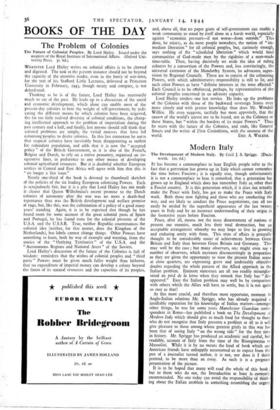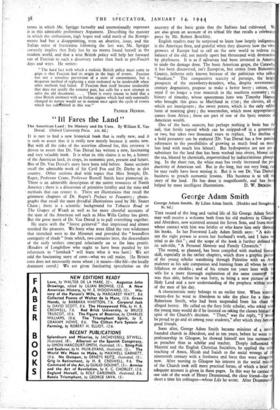Modern Italy
IT has become a commonplace to hear English people refer to the fact that a generation has grown up in Italy which cannot remember the time before Fascism-; it is equally true, though unfortunately it is not a commonplace to hear it remarked, that a generation has grown up in England which does hot remember Italy as,other than a Fascist country. It is this generation which, if it does not actually make the Peace with Italy, has got to make the Peace with Italy work. Both those now fighting and those who are conducting the war; and are likely to conduct the Peace negotiations, can all too easily be misled by the superficial appearance of the last twenty years in Italy and by an incorrect understanding of their origin in the formative years before Fascism.
Peace, after all, means not the mere disarmament of ,nations at present our enemies, much less their total destruction, but an acceptable arrangement whereby we may hope to live in growing and enduring amity with them. This state of affairs is generally thought to be considerably easier of achievement.between Great Britain and Italy than between Great Britain and Germany. This may well be the case ; but many observers, one might even say a number of observers, which increases disconcertingly in proportion as they are given the opportunity to view the present Italian scene at close quarters, are expressing grave and undeniably objective doubts regarding the whole pattern of the Allied approach to. the Italian problem. Eminent statesmen are all too readily misunder- stood au pied de la lettre when they remark that Italy has " dis- appeared." Easy the Italian problem may well be by comparison with others which the Allies will have, to settle, but it is not quite so easy as that!
At this most crucial, and therefore most opportune, moment in Anglo-Italian relations Mr. Sprigge, who has already acquired a justifiable reputation for his knowledge of Italian matters—amongst other things, he was for some years Manchester Guardian corre- spondent in Rome—has published a book on The Development of Modern Italy which should give as much food for thought to those who do not- recognise that Italy presents a problem at all as it will give pleasure to those among whose greatest griefs in this war has been that of seeing Italy "on the wrong side" for the first. time in history. Mr. Sprigge has produced an academic and careful, but readable, account of Italy from the time of the Risorgimento to Mussolini. While it is by no means the kind of book which our American friends have unhappily accustomed us to expect from the pen of a journalist turned author, it is' not, nor does it I think pretend, to be more than an essay. As such it is a pregnant presentation of the picture.
It is to be hoped that many will read the whole of this bpok but to those who do not,. Introduction at least is .earnestly recommended. No one tody can avoid the responsibility of think- ing about the Italian problem in something resembling the urgent
terms in which Mr. Sprigge factually and unemotionally expresses it in this admirable preliminary Argument. Describing the manner in which the enthusiasm, high hopes and solid merit of the Risorgi- mento had but a disappointing, even an abortive, issue, and the Italian sense of frustration following the last war, Mi. Sprigge correctly implies that Italy has by no means found herself in the modern world, and that a wise British policy will help her forward out of • Fascism to such a discovery rather than back to pre-Fascist days and ways. He writes: " The hard fact with which a realistic British policy must come to grips is that Fascism had its origin in the logic of events. Fascism was not a senseless perversion of a state of contentment, but a desperate method of replacing a state reckoned to be intolerable when other methods had failed. If Fascism then itself became intolerable that does not justify the remoter past, but calls for a new attempt to solve the old discontent. . . . There is every reason to hold that a close British intimacy with an Italian regime which had only nominally changed its nature would set in motion once again the cycle of events which has cult-I/Mated in this war."
PATRICK HENSON.



























 Previous page
Previous page